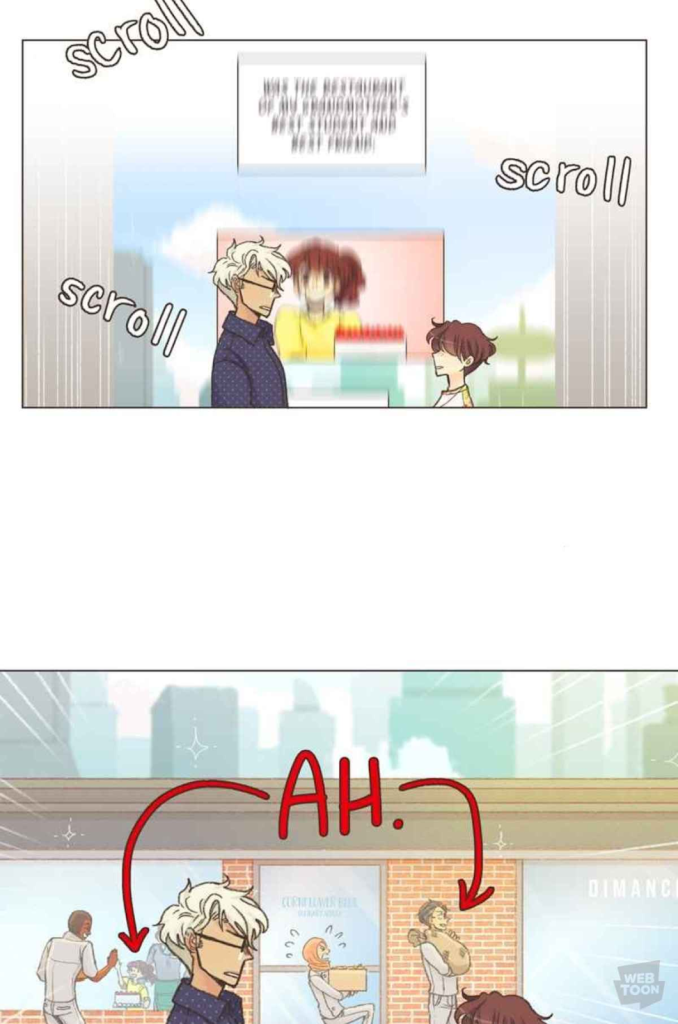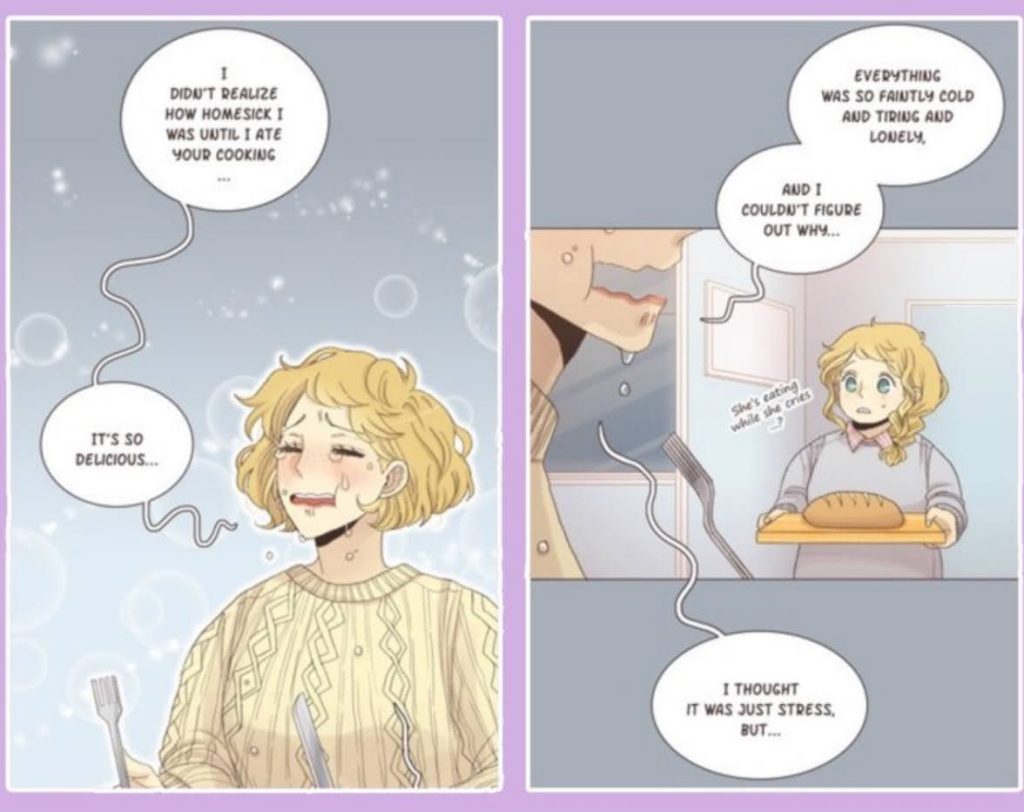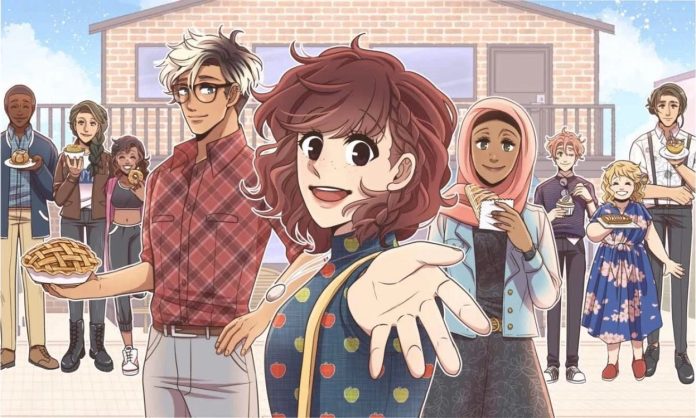Writer/Artist: Leehama
Publisher: WEBTOON (Complete)
Publication Date: December 3, 2017 – March 28, 2020
Rating: All ages
Genre: Slice of life, contemporary, drama, romance
Leehama’s Gourmet Hound ended more than four years ago, and it’s still my favorite vertical scroll comic on WEBTOON. With an overall rating of 9.82 stars out of ten and over 113 million views, it’s clear I’m not the only fan of this understated story about food, friendship, and grief. Here’s what makes Gourmet Hound a comic for the ages.
Gourmet Hound is a deceptively simple story about a lot of different things that all serve to communicate a core theme of food as home. Lucy Fuji is a 25 year old girl with a keen sense of smell and taste, whose grandmother recently passed away.
When she and her friends come to the expensive restaurant Dimanche to revive a tradition Lucy had of eating there with her grandmother, she is shocked to discover that all of the staff she remembers are gone and the food tastes wrong. So she decides to track down every chef that used to work at Dimanche to see if any of them could recreate the taste she remembers from her nineteenth birthday.
First of all, the art in Gourmet Hound is appealing and consistent. It’s not overly rendered or powered by a terabyte’s worth of 3D assets, just detailed enough to convey the information needed about the characters and their world. Leehama’s character drawing style is cute but not too cartoony, clearly influenced by both Eastern and Western comics and animation with the swooshy hair and shiny eyes.
Everything is lovingly detailed: clothes have patterns and stitching, houses have decorative furniture that could believably exist in an apartment owned by a character like that. The color palette is soothingly desaturated, and the food is as appetizing as it should be in a comic all about food and cooking and eating for pleasure.
Leehama is also an expert in paneling, balancing character shots with environment and food shots, and avoiding the long stretches of blank space with a single text balloon that other creators sometimes resort to. Each episode is exactly as long as it needs to be, never stretching things out for more drama than they’re worth. There’s a really lovely sequence where the author “scrolls” through past episodes really quickly in the background as Graham and Lucy try to remember where they’d met before in the past, a clever meta shortcut to visualize memory without words.

But beautiful art is not enough to make a comic memorable. Comics are a combination of art and writing, after all. And the writing in Gourmet Hound is excellent on both the sentence (and panel) level, and the big-picture level of the story as a whole.
The jokes are funny enough that I just burst out laughing at an interaction between Lucy and Graham while rereading this comic for the third or fourth time, and the pacing is so propulsive I started rereading the entire comic from the first episode instead of just looking for panels to screenshot for this review like I’d planned. It’s the kind of story and character progression I see in good fanfiction— a story that makes me want to keep reading without stressing me out with high stakes or perilous situations.
That attention to detail I mentioned earlier extends beyond the visuals. The story spans several months to a year’s worth of time, and Leehama remembers to depict the progression of the seasons with the character’s clothes, food, weather, and holiday celebrations following accordingly.
There are running jokes (the tall “handsome grandpa” bit that’s somehow funnier every time it comes back) and motifs (eggs, representing Lucy and Graham’s relationship with each other). Every episode and every character in the entire comic is named after something food-related, and most of the episodes feature a fun fact about the food-related term in question at the end.
The cast is also diverse in a way that feels natural without being surface-level or unnecessary, and yet even those details are referenced consistently throughout when relevant. Keeping track of so many little details, and doing this consistently for over a hundred episodes, is what elevates Gourmet Hound from a merely good comic into a great one.

The reason Gourmet Hound works so well as a work as a whole is that it’s tied tightly together by its theme: food as love, food as home, food as a way of connecting with others.
Every episode, every side story detour always serves a purpose, developing the characters, their relationships, and elaborating on this basic theme. When Lucy and Graham bond more outside of work for the first time, it’s by getting an absurd amount of eggs in a sale and then cooking together to try and use those eggs up.
When Jacobi wants to figure out what Lucy wants from him, he does so by taking her out for lunch and dinner. And when Lucy finally remembers what the taste she’s searching for is, it’s a food she and her grandma and Chef Bartlett had for dinner together when she was a child, a taste that brings her back to happier times.
Lucy’s grief over the loss of her grandmother and her grandmother’s cooking school is paralleled in the grief the Dimanche chefs still hold over the way their kitchen had fallen apart, and the way they all relate to each other’s pain and heal with food makes the message of food as home land perfectly.

Fans of The Bear looking for something calmer to end their evenings with might enjoy the different ways food, cooking, the restaurant industry, and grief are explored in Gourmet Hound. But also, fans of funny, delicious contemporary comics with a slow-burn romance in the background, and people new to vertical scroll comics who may have missed this comic when it was still updating should absolutely check it out.

